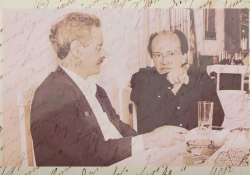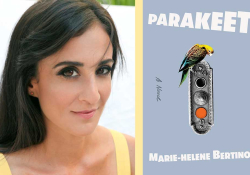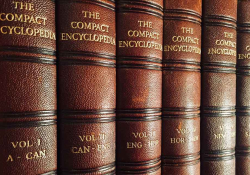Upon Learning That My Book Is Banned in Kuwait

“I must go on. I can’t go on. I’ll go on.”—Samuel Beckett / Photo by paolobarzman
Over the last five years, the Ministry of Information in Kuwait has banned thousands of books. Predictable reactions against this curtailment of free expression have had limited effect. Exhaustion might not be an inappropriate response.
 Upon learning the news that my collection of short stories, The Hidden Light of Objects, was banned in Kuwait, I did not experience the anticipated anger or bitterness. My immediate instinct wasn’t to investigate why my book was banned now, four years after its publication. I didn’t feel compelled to rush out and join the modest public demonstrations taking place against this worrying clampdown on free expression; mine is one of over 4,300 books that appear on a list of books banned by the Ministry of Information over the last five years. I wasn’t inclined to join in the admirable public defense of literature unfolding in local and social media by writers, journalists, and intellectuals. Nor did I consider, even for a moment, contesting the ban in court, as a few brave Kuwaiti authors have done, sometimes with success. What I felt instead upon learning from a Tweet that my book was now officially banned in the country of my birth was an overriding sense of exhaustion.
Upon learning the news that my collection of short stories, The Hidden Light of Objects, was banned in Kuwait, I did not experience the anticipated anger or bitterness. My immediate instinct wasn’t to investigate why my book was banned now, four years after its publication. I didn’t feel compelled to rush out and join the modest public demonstrations taking place against this worrying clampdown on free expression; mine is one of over 4,300 books that appear on a list of books banned by the Ministry of Information over the last five years. I wasn’t inclined to join in the admirable public defense of literature unfolding in local and social media by writers, journalists, and intellectuals. Nor did I consider, even for a moment, contesting the ban in court, as a few brave Kuwaiti authors have done, sometimes with success. What I felt instead upon learning from a Tweet that my book was now officially banned in the country of my birth was an overriding sense of exhaustion.
In recent decades—more decades than I can believe, more than half my life—the distance between that red line and tolerance has become as long as history, a history we choose to forget and so repeat ad nauseam.
The debate around free speech rages on across all parts of the globe, encompassing varying national laws and vastly differing social and political contexts. In Kuwait, Article 36 of its constitution guarantees “freedom of opinion and of scientific research” and that “every person shall have the right to express and propagate his opinion verbally, in writing or otherwise, in accordance with the conditions and procedures specified by law” (10). Article 37 further guarantees “freedom of the press, printing, and publishing in accordance with the conditions and manner specified by law” (11). The first part of these two articles reassures, while the second gives pause. The conditions, procedures, and manners specified by law are, apparently, mutable, open to amendments, which, increasingly over the years, have threatened to overturn the very substance of the articles themselves. The uncrossable “red line”—a favorite phrase used in Kuwait to describe content deemed unworthy of protection—is moveable, gliding from conservative to slightly less conservative in tandem with regional upheavals. Normally the red line involves religion, politics, or sex. In recent decades—more decades than I can believe, more than half my life—the distance between that red line and tolerance has become as long as history, a history we choose to forget and so repeat ad nauseam.
A defense of literature has been underway for at least as long as Plato’s banishment of it from his ideal Republic. From Aristotle to Adorno, Philip Sidney to Percy Shelley, Nietzsche to Derrida, the defense of literature in the name of what it can do has been articulated from all angles, maybe every angle there is to consider. Is there, I ask myself, anything worth adding? Must the familiar justifications be rolled out, yet again, in the certain knowledge that those sitting on the censorship committee at the Ministry of Information will never acknowledge them? They won’t read the millions of words written over the course of thousands of years, nor the more recent rehashing of tired arguments by academics or writers like me. The defense of literature will convince the already convinced, and those in need of convincing, the ones with the power to change the course of events, will not, as Nietzsche put it, have the ears to hear it. Nietzsche declared in Ecce Homo, “Now let us imagine an extreme case: that a book speaks of nothing but events which lie outside the possibility of general or even of rare experience—that it is the first language for a new range of experiences. In this case simply nothing will be heard, with the acoustical illusion that where nothing is heard there is nothing” (40). The censorship committee lacks the ears to hear the wide-ranging implications of fiction, its linguistic inventiveness, its expressions of justice, love, beauty, humor, its generation of empathy—all the infinite things literature can do. Instead, it hears only what it can: transgressions of its red line. So it lengthens its list and marches on, preparing the bleakest future for Kuwait with apparent indifference or, more insidiously, with malicious intent.
Demonstrations, petitions, and social media activism in Kuwait against this recent flurry of bans matter immensely. Even if the number of activists remains relatively small, there is always hope that their effect may intensify over time. I believe in the energy of youth. I teach students at Kuwait University, in the Department of English Language and Literature, who inspire a guarded optimism about the future. Yet my students are the first to remind me that my view is skewed by the fact that most of those who apply to our department—a place where reading remains somewhat valued—are part of a minority. I shudder to think what this recent restriction on books will mean to departments of literature and philosophy at Kuwaiti universities, rare sites where experimental thought is encouraged. All this aside, young people are resisting, and I support their intentions and their actions. I do not, however, initiate my own.
If the call to rehearse the familiar arguments in favor of free speech and the value of literature, along with the call to activism, seem wearying, it is the consolidation by this ban of the Orientalist image of the Middle East in general, and of the Persian Gulf in particular, that is most exhausting of all. Well-intentioned support against “backward” censorship grates, even as I am grateful for it. When I’m told that I’m in good company, or that this will help sales of my book, or that the ban is a badge of honor, what I hear (in part) is confirmation of the Orientalist representation that Edward Said spent his life and career attempting to challenge. This ban allows those who already harbor racist perceptions about the region to hold on to them. Even those who are genuinely sympathetic, on the side of progressive ideals, myself included, are in danger of sliding into Orientalizing platitudes in the name of freedom. In the same way violent protests or actions taken against the representation of Muslims as violent end up inadvertently confirming those representations (consider the Danish cartoons and Charlie Hebdo controversies), the ban against books in Kuwait confirms the image of the country, and the region as a whole, as reactive, fundamentalist, closed-minded, living in the dark ages, among a string of ugly familiars. Even as many of us work to counter such stereotypes, we are thwarted on our home turf, forced to see ourselves in the very representations of backwardness we struggle to disavow.
To put this in temporal terms: exhaustion with the present can initiate movement in the direction of a future yet to come.
My exhaustion derives from a sense that both the problem and the solutions it solicits have remained relatively static for at least two millennia. The problem—the curtailment of free expression—provokes the same series of responses, and while these set responses are sometimes successful and are no doubt necessary, they haven’t been successful enough, or we wouldn’t still be here. The set solutions have been depleted, consumed by the problem itself. Kuwait’s current drama repeats dramas already played out in Stalin’s Soviet Union, Nazi Germany, Franco’s Spain, a McCarthy-era United States, Argentina under military dictatorship, Saddam’s Iraq, and on and on. In the process of proceeding along the same historically predetermined track, scant space is left for alternative approaches and outcomes to unfold. The compulsion to fight the problem in the ways I’ve outlined above is, as I’ve said, necessary, urgent, and deeply ethical. Indeed, such responses often save lives. It’s a relief to know that many remain eager and motivated to continue engagement along this worn-out battlefront. It is, however, a compulsion I’m inclined to resist.
Philosopher Gilles Deleuze writes about exhaustion as a characteristic of Samuel Beckett’s style. Not exhausted into passivity or apathy but, rather, exhausted into transformation or, to use Nietzsche’s notion, transvaluation (96). Perhaps it would be more accurate to say that exhaustion may, in fact, produce passivity or apathy on one front—the familiar and immediate—but that it may provoke activity or change on another—the less habitual and more distant. To put this in temporal terms: exhaustion with the present can initiate movement in the direction of a future yet to come. This is not to say that we should abdicate all responsibility for the present in the name of some obscure future; rather, it is to suggest that a thoroughgoing presentism might contain elements of short-sightedness, even narcissism, detrimental to the yet to come.
Milan Kundera put it this way in his novel Ignorance: “How can a person with no knowledge of the future understand the meaning of the present? If we do not know what future the present is leading us toward, how can we say whether this present is good or bad, whether it deserves our concurrence, or our suspicion, or our hatred?” (143–44). Kundera’s questions imply that we can’t know the present because we don’t know the future this present is preparing the conditions for. His words suggest to me that keeping the future in mind as we live and work in the present may, at the very least, initiate alternative, unconsidered actions (although there can never be any guarantee that things will go the way we want them to). The arguments for freedom of expression and the value of literature have been exhausted; activist demonstrations for cultural tolerance have been exhausted; Orientalist counterarguments have been exhausted. In the midst of this exhaustion with the present, “I’ll go on,” but not in the same direction, not in the same set ways (Beckett 414).
To write anew, again and again, embodying a style that, in the present, only a few will want to hear, requires the kind of discipline that cannot afford to be distracted by that present.
In the exhaustion of possibilities with regard to the problem of censorship, a shift may occur, and from it may emerge a different sort of fabrication or, more appropriate to writing, fabulation. To write anew, again and again, embodying a style that, in the present, only a few will want to hear, requires the kind of discipline that cannot afford to be distracted by that present. Writing through repressive bans and the din of protest alike—in other words, sidestepping both the for and against—in the name of a future unguaranteed, but no less important for that, is to me the pressing concern. The years are shrinking—if I’m lucky, I’m halfway through—and yet so little has changed in Kuwait with regard to that arbitrary red line. It’s time for me, and maybe not only me, to move in a different direction. To be exhausted is not the same as being tired (Deleuze 152). To be tired is to accept that “I can’t go on,” and, therefore, to give in to the parameters of the present (Beckett 414). To be exhausted is to go on anyway, into an unformed future, forming that future as we go, with the materializing wonder of words.
Kuwait University
Works Cited
Beckett, Samuel. Three Novels: Molloy, Malone Dies, The Unnamable. New York: Grove Press, 1958.
The Constituent Assembly. The Constitution of the State of Kuwait. 1962.
Deleuze, Gilles. “The Exhausted.” In Essays Critical and Clinical. Minneapolis: University of Minnesota Press, 1997. 152–74.
Kundera, Milan. Ignorance. Trans. Linda Asher. New York: Harper Perennial, 2003.
Nietzsche, Friedrich. Ecce Homo: How One Becomes What One Is. Trans. R. J. Hollingdale. London: Penguin, 1979.






